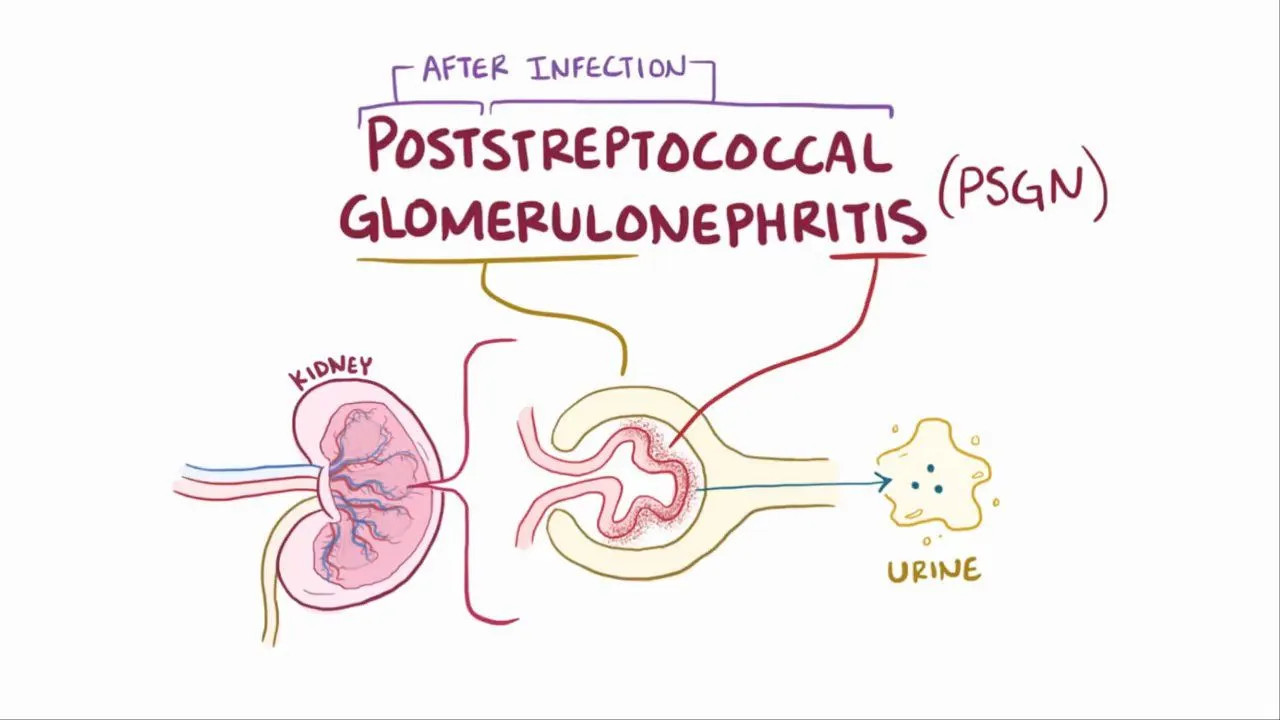Definition
Acute post-streptococcal glomerulonephritis (APSGN) is a kidney disease that occurs after an infection from group A beta-hemolytic streptococcus bacteria. This disease is characterized by a rapid decline in kidney function due to the inflammatory response that follows a streptococcal infection
This condition is usually caused by group A beta-hemolytic streptococcus, also known as nephrogenic streptococcus. This bacteria attacks specific units of the kidney called glomeruli and kidney blood vessels. Most cases appear in children 1-2 weeks after having a throat inflammation or 6 weeks after a skin bacterial infection (impetigo).
The symptoms of APSGN vary from being symptomless to kidney failure, which may require a kidney transplant. Sometimes, APSGN presents symptoms such as nephritic syndrome, including hematuria (blood in the urine), oliguria (low urine output), hypertension, and edema (swelling). However, clinical symptoms can also resemble nephrotic syndrome with significant proteinuria (presence of protein in the urine).
The estimated global incidence of APSGN is around 472,000 cases per year, with approximately 404,000 cases reported in children and 456,000 cases occurring in several developed countries.
Causes
The cause of acute post-streptococcal glomerulonephritis (APSGN) involves the immune system. When the immune system combats an infection, it produces antibodies to identify and fight the bacteria. In children with APSGN, dead bacteria and antibodies become trapped in the kidney's filtration units, known as glomeruli. This entrapment leads to inflammation, resulting in decreased kidney filtration function, which causes difficulty in producing urine and removing waste products from the body.
Risk factor
APSGN more often occurs in individuals who:
- Are elderly
- Are male
- Are of white ethnicity
- Have diabetes mellitus
- Have malignancy
- Consume alcohol
- Are infected with HIV
- Use intravenous drugs
However, APSGN still predominantly occurs in children. Some other risk factors that play a role in developing countries include:
- Poor living environment with inadequate hygiene
- Malnutrition
- Anemia
- Presence of parasites such as intestinal worms
Symptoms
Clinical symptoms of APSGN vary, and some children do not have symptoms, while others may experience specific symptoms such as:
- Blood in the urine (hematuria) can make the urine appear darker or may only be detected during a complete urine lab test.
- Edema (swelling) is caused by fluid accumulation in tissues, leading to swelling around the eyes and ankles
- High blood pressure, which can cause headaches (hypertension)
- Fatigue
- Presence of protein in the urine (proteinuria)
Diagnosis
The diagnosis of APSGN is established through medical interviews, physical examinations, and, if available and necessary, further diagnostic tests. During a medical interview, the doctor will inquire about the symptoms. If the symptoms suggest APSGN, the doctor will proceed with a physical examination and further diagnostic tests.
In physical examinations, the doctor will search for clinical signs that suggest APSGN. In cases of APSGN, doctors may find swelling around the eyelids and ankles and high blood pressure.
Diagnostic tests play a crucial role in diagnosing APSGN. Tests such as a complete urine analysis can assess for hematuria and proteinuria. Additionally, blood tests to evaluate kidney function and signs of streptococcal infection can aid in confirming the diagnosis. The doctor may also perform other blood tests to rule out other medical conditions that mimic APSGN.
Management
In most cases, APSGN is a self-limiting disease and can resolve on its own, with treatment primarily aimed at managing symptoms. The treatment aims to control complications such as hypertension and significant edema during the acute phase of the disease, managing excess fluid volume in the body.
If there is evidence of streptococcal infection, antibiotic therapy should be prescribed by a doctor. Other treatments, such as antihypertensive medication and diuretics to control hypertension and edema, should also be monitored by a doctor. Patients are advised to limit salt intake in their diet to help control swelling and hypertension.
Complications
Complications of APSGN can be severe, including heart failure and azotemia, which can be life-threatening during the acute phase of the disease. Other complications that may appear later include chronic kidney disease and nephrotic syndrome, characterized by protein in the urine, decreased blood protein levels, high cholesterol levels, elevated triglyceride levels, and swelling. Additionally, complications such as hyperkalemia and end-stage renal failure can occur.
However, in general, the incidence of complications is rare if patients receive appropriate medical care tailored to their condition.
Prevention
Preventive measures to avoid APSGN include treating streptococcal infections recognized early, such as during sore throat or skin inflammation due to streptococcal bacterial infections. This is believed to prevent the occurrence of APSGN possibly. Additionally, practicing good hygiene, such as washing hands with soap, can also help prevent the spread of existing infections.
When to see a doctor?
If you or your child experience worsening symptoms, including symptoms such as swelling around the eyelids and ankles, it is advisable to seek further examination by a pediatric specialist (Pediatrician) for children or an internal medicine specialist (Internist) for adults.
The doctor will conduct a medical interview, physical examination, and specific diagnostic tests to establish a definite diagnosis of the underlying disease and determine the appropriate and necessary management.
Looking for more information about other diseases? Click here!
- dr. Yuliana Inosensia
Lumbanbatu SM. Glomerulonefritis Akut Pasca Streptokokus pada Anak. Sari Pediatri. 5:2 58-63. 2003 September. https://saripediatri.org/index.php/sari-pediatri/article/download/929/861
Rawla P, Padala SA, Ludhwani D. Poststreptococcal Glomerulonephritis. [Updated 2021 Dec 12]. In: StatPearls [Internet]. Treasure Island (FL): StatPearls Publishing; 2022 Jan-. Available from: https://www.ncbi.nlm.nih.gov/books/NBK538255/
Mount Sinai. Post-streptococcal glomerulonephritis. July 2022. https://www.mountsinai.org/health-library/diseases-conditions/post-streptococcal-glomerulonephritis-gn#:~:text=Poststreptococcal%20glomerulonephritis%20(GN)%20is%20a,of%20red%20blood%20cell%20production.
CDC. Post-streptococcal glomerulonephritis. July 2022. https://www.cdc.gov/groupastrep/diseases-public/post-streptococcal.html
Medscape. Acute post-streptococcal glomerulonephritis. December 2018. https://emedicine.medscape.com/article/980685-overview#a1







